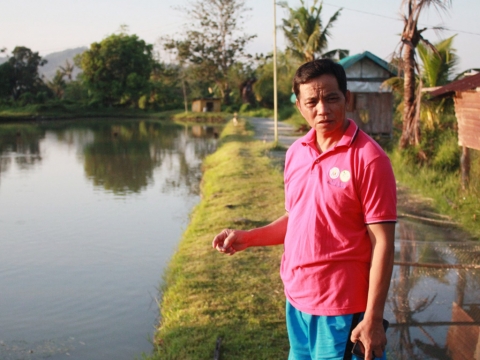Danilo Trongco shows the grow-out ponds they have for tilapia, carp, and pangasius at DJ’s Farm in Abra. (photo from ATI-Cordillera Administrative Region)
DILIMAN, Quezon City—Polyculture can help local fish producers maximize the utilization of their ponds and cater to the expanding consumer demand, according to a practitioner in Lagangilang, Abra.
Danilo Trongco, owner of DJ’s Farm in Brgy. Nagtupacan, said in a radio interview that polyculture fish production, or the simultaneous culture of two or more non-competing fish species, is more productive and profitable compared with monoculture.
According to Trongco, polyculture can start with growing five pieces of tilapia, one carp, and one pangasius (cream dory), ideally, in a square meter area.
“Tilapias are surface-feeders. Carp and pangasius, on the other hand, are bottom-feeders so they can eat from the waste of the tilapia,” Trongco said.
He also shared his feeding technique that starts during pond preparation with the use of mostly chicken dung mixed with small amounts of commercial feeds. Through this, he is able to minimize production cost in the farm.
To maintain the good quality of his produce, the polyculture expert said that replenishment of pond water should be done every week. This is to remove the accumulated wastes and keep the fish from having foul odor or “amoy gilik.”
Harvest can start after about four months. Selective harvesting can also be done by totally draining the water from the pond.
Fish harvested from DJ’s Farm are directly sold to customers on site and in the public market.
“It was challenging at first. People used to think that cultured fish tasted bad because it had unpleasant smell. But, with the new technologies available, we are able to produce fish that is delicious,” Trongco said.
Through word of mouth, more customers are learning about Trongco’s fish produce. Because of this, he is able to get an average of 40 percent return of investment.
He noted that his current income is about three times more than what he got when he was still growing rice in his two-hectare farm.
Trongco was recognized as Gawad Saka Outstanding Fisherfolk in 2011 and as Abra’s Finest in 2017. He also serves as the local government’s partner in extension as Magsasaka Siyentista and is a certified Learning Site for Agriculture cooperator of the Agricultural Training Institute (ATI).
His interview was aired last May 15 on the ATI’s “Agri Asenso” program on DZRH radio, television, and online channels.

